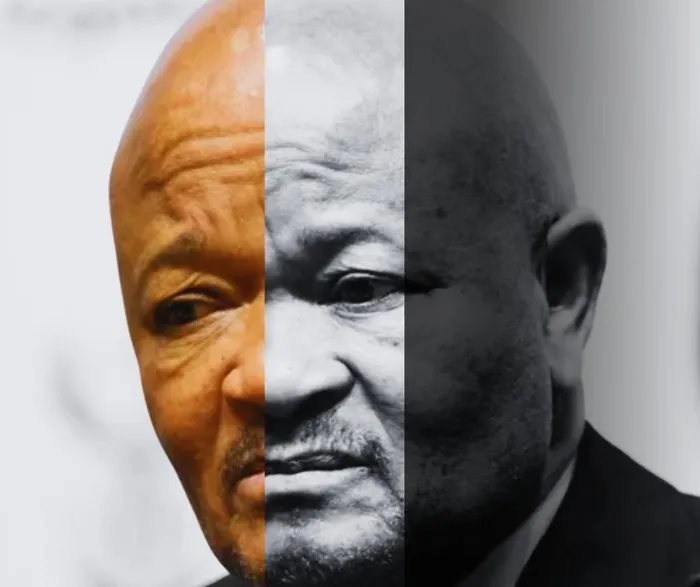Traditional leaders rally behind Minister Senzo Mchunu amid Madlanga Commission

Amid allegations of political interference, Police Minister Senzo Mchunu has received unwavering support from the Amakhosi of the Mchunu clan.
Image: IOL Graphics
Embattled police minister Senzo Mchunu has received strong backing from the Amakhosi of the Mchunu clan, who have stated that there is no wrongdoing that has surfaced to implicate the minister.
They mentioned that even during their engagement with him, they found nothing in his account of events that suggested he did anything untoward. Mchunu met with the Amakhosi of the Mchunu clan a few days ago to explain himself.
He is currently on special leave following allegations by the KwaZulu-Natal police commissioner Lieutenant-General Nhlanhla Mkhwanazi of political interference in the work of the police.
The allegations led to President Cyril Ramaphosa establishing a commission of inquiry, chaired by Justice Mbuyiseli Madlanga, into the state of policing in the country; it commenced last week. Mkhwanazi testified for three days last week, and other top police officers are expected to testify this week.
Political and cultural experts said this meeting is a “textbook move” for politicians, especially in KZN, every time they are under pressure.
The Amakhosi of the Mchunu clan have told The Mercury that in their engagement with the suspended minister of police, they found nothing wrong that he had done. They stated that Mchunu remains “one of them,” indicating he has their full support.
One of the leaders of the Amakhosi of the Mchunu clan, Bhekimpi Mchunu, had stated last week that they had asked Minister Mchunu to come and explain what was happening, as all they were hearing was through the media. They wanted to hear directly from him.
Bhekimpi yesterday said most of their engagement remains a confidential matter and that they had engaged as a family.
“We sat down with the minister, and he explained in detail the sequence of events. While I am not at liberty to share what was discussed, I can tell you with certainty that in his account, we found no wrongdoing on his part. We found nothing that shocked us or implicated him.
“We decided that we would then let the proceedings continue as they have started, and we would listen to whether anything that points to his actual wrongdoing in the matter would emerge. To date, we have been listening to the proceedings of the commission, and nothing has surfaced that speaks to what he has actually done. We want to state clearly that he is one of us, and he remains one of us,” he said.
Professor and cultural expert Musa Xulu said it is a common practice for politicians, especially KZN politicians, to drift back to their tribal collective when they are under pressure.
He said this phenomenon is known as identity politics, which is familiar in political sciences and sociological studies. He added that politicians generally do not trust other politicians, especially those from their own political parties. This becomes worse when storms arise.
“With the Mkhwanazi whirlwind, Minister Mchunu currently feels that the only people he can trust are the Mchunu traditional leaders and the entirety of their clans. When politics gets tough, cultural traditionalism becomes the more stable alternative. Politics changes every day, every moment, but traditional institutions tend to be very slow to change. The existence of traditional leadership systems and structures alongside democracy in KZN provides politicians with a temporary sanctuary when political fortunes diminish.
“This has happened with most political leaders in this province, including President Zuma after his sacking by Thabo Mbeki and the late Mangosuthu Buthelezi, who would switch between the politics of Zulu cultural traditionalism and modern politics,” Professor Xulu added.
Political analyst Siyabonga Ntombela noted that the strong support was predictable, as the only outcome of the meeting, indicating that the version presented at the meeting would have been that of the minister.
“I have my doubts if it was the Amakhosi who called the meeting; I believe he (the minister) called the meeting in order to explain to them his point of view and to address any concerns about bringing the Mchunu surname into disrepute. I believe if the matter had come from the side of the Amakhosi, even the Zulu Royal House would have called Mchunu and the Amakhosi to come and explain the situation,” Ntombela stated.
He added that the engagement could still have a strong impact in providing Mchunu with public support.
“Despite the fact that he engaged with only the Amakhosi from the Mchunu clan, the Amakhosi still have influence over a large number of people. If they can get the Izinduna on their side and tell them that they had engaged with Mchunu and believed what he told them, that message and support could soon spread to many communities,” Ntombela said.